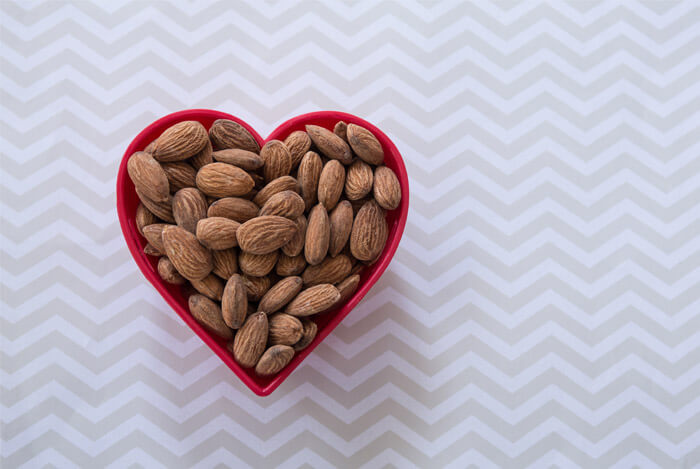Did you know that almonds are actually seeds, and not nuts?
This reminds me of the whole tomato thing. I’m sure you know, but tomato is a fruit, not a vegetable. It’s just the scientific classification versus how it is used in the kitchen that makes it so confusing.
It’s true, almonds come cased in a hard shell within types of fruits called drupes. When you think of a drupe, think of a peach, which is typical for a drupe. It has that fleshy outside, and a hard, stone like seed in the middle. But within that stone like casing, there is a seed.
Almonds, compared to other foods, are fairly low in calories, and come packed with vitamins and nutrients like calcium, vitamin E, and antioxidants.
They are also incredibly versatile, you can eat them raw, roast them, or slice them up and put them in your salad, yogurt, or oatmeal.
Let’s get into some important health benefits of this crunchy treat!
- 1. Antioxidants
- 2. Prevention of Gallstones
- 3. Energy Production
- 4. Weight Loss
- 5. Good Fats
- 6. Vitamin E
- 7. Heart and Blood Health
- 8. B Vitamins
- Ways to Eat Almonds
Table of Contents
1. Antioxidants
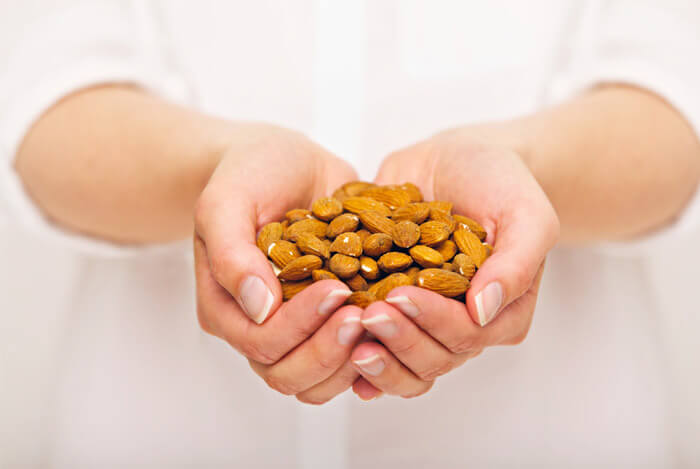
As I mentioned before, almonds can benefit you greatly in terms of reducing your risk for many diseases. This is mostly due to their high amount of antioxidants and key nutrients.
Almonds contain many antioxidants including flavonoids, which are also found it fruits, vegetables, and teas. I mentioned flavonoids in my discussion on green tea – they scavenge free radicals that damage our bodies and make us age.
Almonds also contain antioxidants called catechins, found in citrus fruits. Catechins are phytochemicals that are rich in health benefits, including the ability to stabilize free radicals, such as environmental toxins like cigarette smoke.


2. Prevention of Gallstones

Gallstones are hard formations in your gallbladder, the organ in your body that stores bile made in your liver. This can cause pain in the upper abdomen, a yellowing of your skin, nausea, and weird clay colored stools.
Gallstones are more common in women, older people, and those who are overweight. Not only that, but birth control, hormone therapy, and pregnancy can increase women’s chances of having gallstones.
This is alarming because gallstones, in 80% of patients, don’t cause any symptoms.
The good news is that seeds and nuts, particularly almonds, have been associated with reduced occurrence of gallstones. This is mainly due to their cholesterol lowering effects and benefits from antioxidants.
3. Energy Production

Like I said before, almonds are nutritionally dense. So it makes sense that they are a good source of energy production. About 20 almonds, has more protein than one egg, and is filled with manganese, copper, B vitamins, and magnesium. Magnesium, which I’ll call out, is part of hundreds of processes in our bodies, including the production of energy.
Let’s run down the benefits of the other good stuff:
- Manganese – Essential to bone structure, bone metabolism, and building bones. A deficiency of manganese results in high blood pressure, circulatory issues, bone issues, and other not so fun symptoms.
- Copper – Essential for the liver, brain, heart, kidneys, and muscles. Copper helps form an important protein called collagen, which is part of many body tissues including fresh, healthy looking skin.
- B Vitamins – We’ll go into more details on this later, but B vitamins play key a role in keeping our bodies running properly and converting food into energy to do daily tasks.
Almonds really are the perfect little energy snack. The combination of high protein, good fats, and fiber in almonds helps to slow down digestion and produce more controlled energy, keeping us awake and alert while curbing our appetites at the same time.
Leading me to the next great benefit…weight loss.
4. Weight Loss
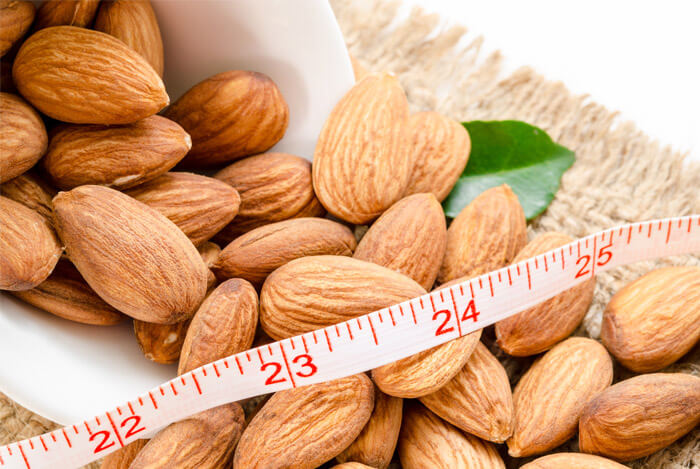
High protein, good fats, and fiber? Well it makes perfect sense that almonds also help in weight loss.
A study in 2003 showed that participants of an “almond diet” saw an 18% reduction in weight and 14% decrease in waist size.
Further, a study posted in the European Journal of Clinical Nutrition showed that eating almonds results in appetite reduction, indicating that almonds make a great snack option.
This is assuming you’re being smart about your other food choices, too. Be sure to eat them in moderation to keep your calories under control.
5. Good Fats
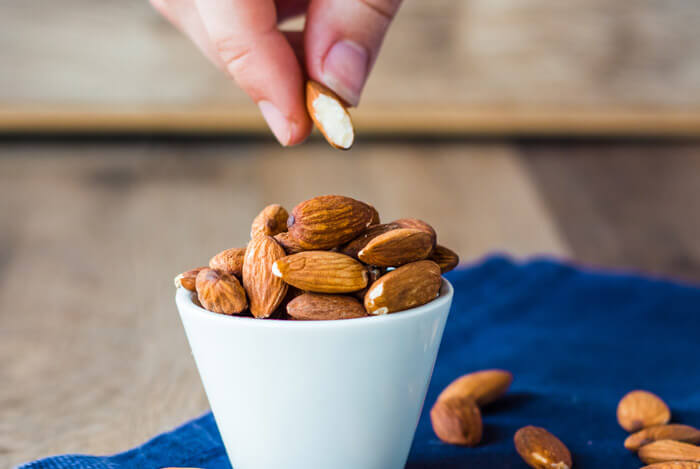
In 1 cup of almonds there is 45 g of fat. Now that may sound like a lot but 28 g of that is monounsaturated fat, followed by 11 g polyunsaturated, and just 3.4 g saturated fat.
Monounsaturated fats have long been known for their benefits in helping cholesterol.
Yes, almonds contain fat, but they can be part of a healthy diet.
6. Vitamin E

This is one of the better known benefits of almonds. They come packed with vitamin E, also known as alpha-tocopherol, or AT – containing 36.6 mg per cup. Most Americans only get about half the daily recommended value of vitamin E, but a cup of almonds contains 125% of your daily value of vitamin E.
Okay, you might not eat 1 cup of almonds in one sitting, but even if you ate 1/4 cup per day you’d get 32% of your daily vitamin E intake.
Check out vitamin E’s benefits:
- Vitamin E helps thin the blood, which prevents clumping. This reduces risks associated with cardiovascular issues.
- Vitamin E’s antioxidant properties help circulate blood to the skin, and help to nourish skin cells.
7. Heart and Blood Health
Because almonds are so high in healthy fats, they may help reduce blood clots that lead to heart attacks. The blood thinning effects also put less strain on your arteries.
But for those that already have high levels of cholesterol, or are “hyperlipidemic”, it is commonly believed that you shouldn’t be eating high fat foods, even if those fats are considered good. However, a study posted in the American Heart Association’s Journal, “Circulation”, showed otherwise.
Results from a randomized study of 27 hyperlipidemic individuals, showed that almonds added to the diet largely reduced coronary heart disease risk. This is likely due to the high fiber, high protein, and good fats. So fear not – the high ‘fat’ in almonds isn’t a deterrent. Munch away!
8. B Vitamins

Almonds contain many B vitamins, which as stated earlier are important in energy regulation.
Let’s look at the amount of B vitamins in almonds and the benefits of B’s more closely:
- Vitamin B1 (Thiamin) 0.29 mg per cup – Aids in improving reaction time and helping the body make new cells.
- Vitamin B2 (Riboflavin) 1.62 mg per cup – Aids in reducing headaches, fights free radicals, and is important in blood cell production.
- Vitamin B3 (Niacin) 5.17 mg per cup – Helps in reducing anxiety, diabetes symptoms, preventing Alzheimer’s, reducing arterial plaque, and boosting HDL (good cholesterol).
- Vitamin B6 (Pyridoxine) 0.13 mg per cup – Aids in regulating mood and sleep.
- Vitamin B9 (Folate) 63 ug per cup – Aids in regulating mood. You may have heard that folate is important for women who are pregnant. That’s because it can help support a growing baby and help reduce birth defects, especially when taken during the first trimester.
Ways to Eat Almonds
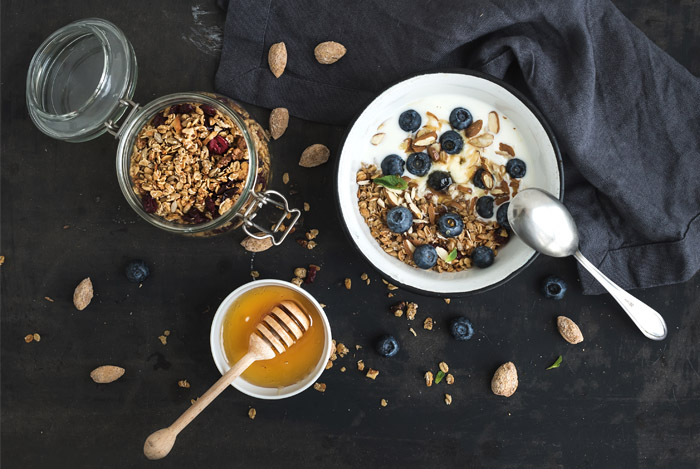
You don’t have to simply grab a handful of almonds as a snack. There are other ways to get this super food into your diet. I’m sure you’ve seen some of them around, but let’s fire some off anyway.
- Salad: Crunchy? Yes – try swapping out croutons with almonds – sliced or whole. Almonds will add that texture and more with their super health benefits. Why not make that salad a super salad – just add almonds.
- Yogurt – This is probably my personal favorite. Throwing a few almonds into your yogurt or parfait will add that savory almond flavor.
- Oatmeal – Oatmeal can be a little boring by itself, so it helps to add fresh fruit, but how about throwing a little bit of crunch into the mix and starting your morning off with some additional fat-fighting and appetite-curbing super food. Just add almonds!
There are plenty other ideas out there, but I wanted to jog your creativity and get you thinking about the different ways you can eat almonds.
